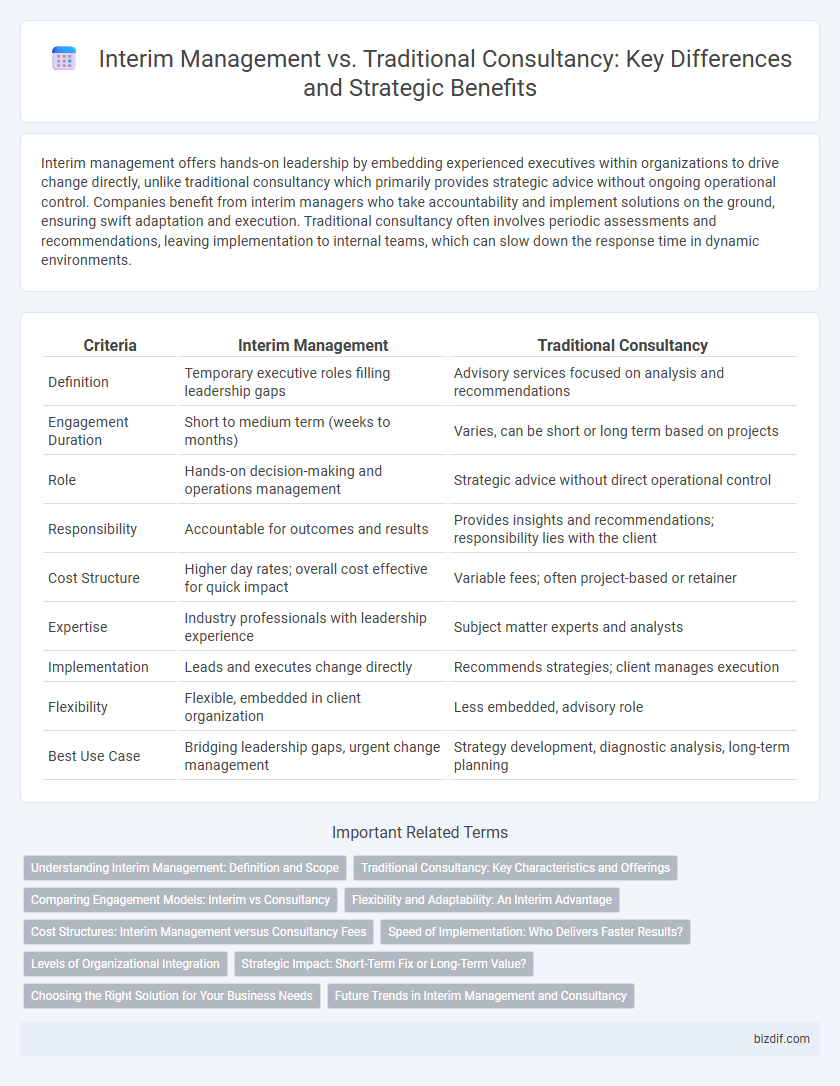Interim management offers hands-on leadership by embedding experienced executives within organizations to drive change directly, unlike traditional consultancy which primarily provides strategic advice without ongoing operational control. Companies benefit from interim managers who take accountability and implement solutions on the ground, ensuring swift adaptation and execution. Traditional consultancy often involves periodic assessments and recommendations, leaving implementation to internal teams, which can slow down the response time in dynamic environments.
Table of Comparison
| Criteria | Interim Management | Traditional Consultancy |
|---|---|---|
| Definition | Temporary executive roles filling leadership gaps | Advisory services focused on analysis and recommendations |
| Engagement Duration | Short to medium term (weeks to months) | Varies, can be short or long term based on projects |
| Role | Hands-on decision-making and operations management | Strategic advice without direct operational control |
| Responsibility | Accountable for outcomes and results | Provides insights and recommendations; responsibility lies with the client |
| Cost Structure | Higher day rates; overall cost effective for quick impact | Variable fees; often project-based or retainer |
| Expertise | Industry professionals with leadership experience | Subject matter experts and analysts |
| Implementation | Leads and executes change directly | Recommends strategies; client manages execution |
| Flexibility | Flexible, embedded in client organization | Less embedded, advisory role |
| Best Use Case | Bridging leadership gaps, urgent change management | Strategy development, diagnostic analysis, long-term planning |
Understanding Interim Management: Definition and Scope
Interim management involves temporarily placing experienced executives in key leadership roles to address specific business challenges or transitions, typically lasting from a few months to a year. Unlike traditional consultancy, which provides advisory services and strategic recommendations, interim managers assume full operational responsibility and decision-making authority within the organization. This hands-on approach enables rapid implementation and agile responses to evolving business needs, driving immediate impact and sustainable change.
Traditional Consultancy: Key Characteristics and Offerings
Traditional consultancy provides expert advice and strategic planning to improve organizational performance across various industries. Consultants analyze existing processes, identify inefficiencies, and deliver tailored recommendations to guide decision-making. Services often include market research, risk assessment, change management, and long-term strategy development.
Comparing Engagement Models: Interim vs Consultancy
Interim management offers hands-on leadership by embedding experienced professionals directly within an organization to execute change, while traditional consultancy primarily provides strategic advice and recommendations from an external perspective. Engagements in interim management are typically time-bound with full accountability for results, contrasting with consultancy projects that focus on delivering reports and action plans without direct operational control. Organizations seeking immediate impact and leadership continuity often prefer interim management, whereas those needing expert analysis and strategic guidance lean towards traditional consultancy models.
Flexibility and Adaptability: An Interim Advantage
Interim management offers unparalleled flexibility and adaptability by embedding seasoned executives directly within organizations to lead change and make swift decisions, unlike traditional consultancy which often provides external advice without hands-on execution. Interim managers adjust strategies in real-time, responding promptly to evolving business challenges and aligning with shifting priorities. This hands-on approach accelerates problem-solving and drives immediate impact, a significant advantage over conventional consultancy models.
Cost Structures: Interim Management versus Consultancy Fees
Interim management typically involves a fixed monthly fee or daily rate covering comprehensive leadership responsibilities, often resulting in lower overall costs compared to traditional consultancy fees, which are usually billed hourly or project-based with additional expenses. Traditional consultancy services may incur higher cumulative charges due to extended engagement periods, administrative overheads, and variable consulting days. Organizations seeking cost-effective, hands-on management solutions frequently prefer interim management for its transparency and alignment with operational budgets.
Speed of Implementation: Who Delivers Faster Results?
Interim management delivers faster results by embedding experienced leaders directly within organizations to make swift, decisive changes, bypassing lengthy approval processes typical of traditional consultancy. Traditional consultancy often involves extended analysis, reporting, and strategy phases before implementation begins, delaying impact. The hands-on approach of interim managers accelerates execution, providing immediate operational control and quicker realization of objectives.
Levels of Organizational Integration
Interim Management offers deeper organizational integration by embedding experienced executives directly within company workflows to drive immediate change. Traditional Consultancy typically provides external advice and strategic recommendations without long-term operational involvement. This difference in integration levels affects the speed and effectiveness of implementing solutions within the organization.
Strategic Impact: Short-Term Fix or Long-Term Value?
Interim management delivers strategic impact through hands-on leadership that drives immediate transformation and operational continuity during critical periods, ensuring short-term fixes are effectively implemented with accountability. Traditional consultancy offers long-term value by providing comprehensive analysis, frameworks, and recommendations to shape organizational strategy and sustainable growth. The crucial difference lies in interim management's active decision-making role versus consultancy's advisory capacity, influencing how organizations balance urgent needs with future positioning.
Choosing the Right Solution for Your Business Needs
Interim management offers hands-on leadership by embedding experienced executives directly within your organization to drive immediate change, contrasting with traditional consultancy, which provides strategic advice and recommendations from an external standpoint. Selecting the right solution depends on factors such as the urgency of project execution, the complexity of business challenges, and the need for direct accountability. Businesses facing critical transitions or requiring rapid operational improvements often benefit from interim management, while those seeking strategic guidance or long-term planning may find traditional consultancy more suitable.
Future Trends in Interim Management and Consultancy
Future trends in interim management emphasize agile leadership, rapid deployment of specialized skills, and digital fluency to address evolving business challenges. Traditional consultancy increasingly integrates data analytics and AI-driven insights to provide strategic recommendations, while interim managers offer hands-on implementation and change management on-site. Hybrid models combining consultancy's advisory strengths with interim management's operational execution are poised to dominate the market landscape.
Interim Management vs Traditional Consultancy Infographic

 bizdif.com
bizdif.com